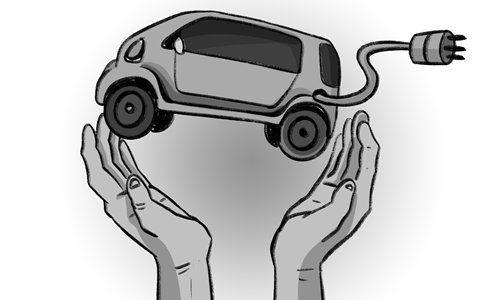HOME >> BUSINESS
China’s manufacturers and market take the lead to embrace green vehicles
By Wen Sheng Source:Global Times Published: 2019/7/10 20:53:40

Illustration: Luo Xuan/GT
Although overall car sales in China have waned in the past 10 months, electric vehicles (EVs) have picked up the slack, thanks to the government's steadfast efforts to spur consumption of green cars. The plan is to cut the country's heavy reliance on imported oil and to reduce petrol-fired vehicles' choking tail-gas emissions.
Thanks to the government's policies being skewed in favor of electric cars, China remains the world's flag-bearer in fostering a revolutionary shift from traditional inner-combustion cars to green electricity-powered mobility.
Backed up by China's massive and growing middle-class, the country saw electric vehicle sales topping 1.26 million in 2018, accounting for 50 percent of gross EV sales around the world. In comparison, 359,000 EVs were sold in the US last year.
In 2019, China's electric car sales are expected to hit 1.7 million, or a modest 35 percent growth on the previous year, according to the China Association of Automobile Manufacturers (CAAM).
It is very refreshing to see a rising number of cars with green license plates running in many Chinese cities. Air quality in major Chinese cities, Beijing, Shenzhen and Shanghai in particular, is improving this year, to which vigorous promotion of electric vehicles can be attributed, proportionately.
In Shenzhen, the rising technology hub neighboring Hong Kong, all the city's public buses, utility vehicles and its massive taxi fleet have become electric. By the end of 2019, all gas-powered buses in Beijing and Shanghai will be replaced by EVs. Instructed by China's central government, scores of second-tier Chinese cities, including Hangzhou, Chengdu, Xi'an and Tianjin are scrambling to shift to EVs.
The far-sightedness or vision of the government to press ahead with EVs is laudable. As the world's most populous country and a rising economic powerhouse, China, as a signatory of the Paris climate agreement, needs to set an example for other countries to resolutely cut oil consumption and reduce their carbon footprints.
At the same time, by investing and exploring EVs, the country can eke out unique manufacturing and technology prowess.
Currently, four big electric vehicle groups in China - BYD in Shenzhen, BAIC in Beijing, Geely in Zhejiang and SAIC Motor - account for 70 percent of the country's electric vehicle sales. Also, with heavy financial backing from technology giants including Tencent, Alibaba and Baidu, two dozen electric vehicle startups have come into play, including WM Motor, Nio, Byton and Xpeng Motors.
With so many players, market competition will be fierce, which is what the Chinese government desires. Beginning in 2015, it was giving generous sales subsidies to spur a mushrooming of EV makers.
On June 26 this year, the government slashed the subsidy in half. Although the government has decided to drastically reduce its subsidies on EV sales, it prolongs the policy of omitting the 10-percent car consumption tax, which it levies on all gas-powered vehicles in the country to offset the negative impact of the 50-percent cut in government subsidies.
South China's emissions-sensitive Hainan Province is encouraging more EV sales on the island, designated as China's largest free trade port and special economic zone, with no EV selling restrictions on Hainan's permanent residents. Earlier, the province came out with a brave administration order to ban inner-combustion vehicle sales starting in 2030.
To make the electric car industry stronger, the Chinese government has also opened the sector to global carmakers including Tesla and Toyota to ratchet up market competition. Only through competition can the EV industry consolidate and stand on firmer ground.
Thanks to improving technology and manufacturing efficiency, prices of EV batteries continue to fall, and industry analysts predict that in four to five years it will be cheaper to buy an EV in China than a fossil-fuel powered car.
Starting from scratch, China now leads Britain, Japan, the US and other countries in electric-vehicle manufacturing and consumption. Two factors have contributed to the sector's progress - Chinese urban residents' ire of choking vehicle emissions and notorious air pollution, and the Chinese government's vision to foster a new flourishing industry.
The author is an editor with the Global Times. bizopinion@globaltimes.com.cn
Posted in: EXPERT ASSESSMENT